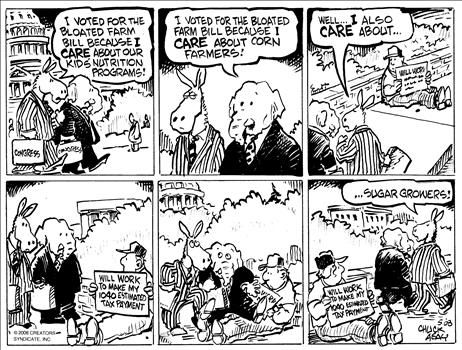Earlier this year, I spent five days in Iraq, walking the same streets in Baghdad where I had served two years earlier as an infantry platoon leader in the 101st Airborne Division.
The visit reinforced for me not only the immense complexity of the war – so often lost in our domestic political debate – but also the importance of taking the time to visit Iraq to talk with the soldiers and Marines serving on the front lines in order to grasp the changing dynamics of a fluid battlefield. [snip]
America is longing for an informed and principled debate about the future of Iraq. However, such a debate seems unlikely if the Democratic nominee for president won't take the time to truly understand the dynamics on the ground, let alone meet with commanders.
The time for talking points is over. Too much is at stake. When will Mr. Obama finally return to Iraq and see the situation for himself.
READ MORE
Monday, June 9, 2008
Why Obama Must Go to Iraq
Iraqi, Coalition Forces Continue Securing Northern Iraq
Many areas in the region -- which stretches from Baghdad to Iraq’s border with Syria and Turkey -- continue to show signs of a return to normal life for the people who live there. In Iraq’s Diyala province, for example, very little enemy activity has been going on for more than 45 days. [snip]
Hertling said he’s encouraged by the successes in Mosul and the degree to which the credit belongs to Iraq’s own troops. “The Iraqi security forces are doing independent operations, and we’re supporting them,” he said, noting that their knowledge of the area and its people are a key element in their success. Having seen the earliest days of today’s Iraqi military, Hertling said, he’s impressed by how far they’ve come.
“The capability of the Iraqi army, especially since the last time I was here, since 2003-2004 when they were first standing up, has been significantly improved,” he said. “They are gradually improving their capability and their effectiveness.”
READ MORE
L.A. Times on Terror Financing: Misses Key Reasons Why It's So Hard to Track
The Los Angeles Times runs a story today about the difficulties that the US is having in tracking and shutting down terrorist financial operations. The story leads with a number of factors impeding both our domestic and international efforts:
[Bush administration is 'undermined', the terrorists are smarter than the feds and have found work-arounds, Bush administration 'stumbling' with interagency fighting, and of course no other nation trusts the US anymore so cooperation is imperfect. etc...]Can anyone spot what's missing? Anyone?
Apparently the Times doesn't think that the media's disclosure of the nature, procedures, and targets of those programs could have a deleterious effect on their effectiveness and foreign cooperation. Moreover, the Times doesn't think that the House Democrats' refusal to grant immunity to telecom companies who helped the government with foreign intelligence gathering could be interpreted by foreign banks and governments as a warning of might be in store for them if they, too, make the mistake of assisting the US is tracking down terrorist transactions.
And certainly, the House Democrats' refusal to renew the Patriot Act couldn't have any effect on our ability to locate and track new targets for investigation. No, certainly not. But we wouldn't want to question their patriotism.
READ MORE
The Cluster Behind the Cluster Munitions Ban
Which brings us to the cluster munitions treaty announced in Ireland on May 30. Hosannaed by "the international community" and hailed by anti-Americans, the treaty is another attempt to politically cleanse warfare.
The anti-Americanism exploited by many treaty advocates is both disgusting and sclerotic. The Atlanta Journal-Constitution's May 31 report opens with
"Negotiators of a landmark treaty banning cluster bombs predicted the pact will make it too politically painful for the United States ever to use the weapons again."China, Russia, India, Pakistan and Israel reject the treaty, but America is the big rhetorical target. This is a legacy of the Cold War, when unilateral disarmers largely focused on the United States -- kicking America cost them zip politically, and they had no influence over Communist totalitarians.
The United States, its critics to the contrary, remains the most benign global power that has ever existed, so piquant displays of self-righteousness by activists still have no downside...
READ MORE
The War on Zionism
[HT:JD]
Post Annapolis, the Palestinian Authority made it crystal clear that it will never recognize Israel as a "Jewish state". Furthermore, it made it crystal clear that it will not compromise on Jerusalem by making it a capital offense to do so. Yet negotiations continue. [?] Either Olmert doesn't believe the PA or what is more likely, he will still cut a deal where Israel is denied that recognition and will divide Jerusalem according to Arab demands.
Do not think for a moment that these entrenched Arab positions are negotiable. They aren't and never have been...
[i.e., any plan for peace requires parties - plural - who desire it. As long as victimhood is profitable {to the tune of 7B$ pledged this year}, there'll only be one; Israel]
READ MORE
Georgia Is Warned by Russia Against Plans to Join NATO
Russia - President Dmitri A. Medvedev of Russia warned the Georgian president, Mikheil Saakashvili, on Friday that Georgia’s joining NATO would deepen the conflict between the former Soviet states.
READ MORE
Chinese parents fight forced abortions
QIAN'AN, China - Yang Zhongchen, a small-town businessman, wined and dined three government officials for permission to become a father. But the Peking duck and liquor weren't enough. One night, a couple of weeks before her date for giving birth, Yang's wife was dragged from her bed in a north China town and taken to a clinic, where, she says, her baby was killed by injection while still inside her.
READ MORE
G8, Asia urge oil production hike as prices soar
Japan — Eleven nations that guzzle nearly two-thirds of the world's energy called Sunday for an urgent hike in global oil production as host Japan warned the world could plunge into recession. Energy ministers from the Group of Eight (G8) industrial powers were meeting in the northern Japanese city of Aomori with officials from China, India and South Korea in the wake of a record spike in oil prices.
The 11 nations represented here voiced "serious concerns" over the level of oil prices and said there was an "urgent need for increased and timely investment in the energy sector."
In a joint statement, they called for boosts to their own production and asked major oil producers "to increase investment to keep markets well supplied in response to rising world demand."
The first meeting is to be held this year. The 11-nation talks came after oil prices on Friday posted their highest ever one-day gain of nearly 11 dollars, hitting a new record of 138.54 dollars a barrel in New York trade. "If we leave this situation as it is, it could lead to a recession of the world economy," Japan's energy minister Akira Amari said as he opened the meeting.
READ MORE
'Sixth Sense' Creator to Release Global Warming Horror Movie in June
For several months, NewsBusters has been reporting the new horror movie genre "Global Warming's Gonna Kill You!"
Entering the fray is M. Night Shyamalan, the writer/director of 1999's smash hit "The Sixth Sense."
Set to open coincidentally on Friday, June 13, "The Happening" is Shyamalan's move "to milk global warming for all the terror and despair it's worth."
So say USA Today's "Weather Guys" (emphasis added, trailer embedded right): ...
READ MORE
Baltimore Looks to Ban Cheap Cigars
Hoping to curb the increase in the number of people who smoke small, inexpensive cigars, Baltimore plans to bar shops from the common practice of breaking open packages to sell them individually...
[government?]
READ MORE
WHO STOLE THE AMERICAN SPIRIT?
There is no denying that the current financial morass is deep and painful. But, looking back over the past century, it would be a stretch to rank the current problems as especially notable or dramatic:
• Right now we have an unemployment rate of 5 percent and headline inflation topping 4 percent.These are hardly statistics to celebrate, but they are a far cry from the crises of the 20th century, says Karabell:
• We have economic growth of 0.6 percent, extremely low consumer confidence and weakening consumer spending, small business optimism at a 28-year low, and a housing market that is showing declines in excess of 20 percent.
• The unemployment rate in 1933 was 24.9 percent; seven years later, after the intensive efforts of the New Deal, it stood at 14.6 percent.The alternative to grime-encrusted lenses isn't rose-tinted glasses, but more equanimity about our weaknesses and our strengths would surely help us navigate.
• The unemployment rate went from 4.9 percent in 1973 to 8.5 percent in 1977, and then nearly broke 10 percent in 1982.
• While the recent collapse of Bear Stearns shocked Wall Street, in 1933 alone 4,000 banks failed, and millions not only lost their homes but were rendered homeless.
Unfortunately, the problem with downward spirals is, well, that they spiral downward...
READ MORE
Border peril prompts Amado school meeting
[HT: DG]
The U.S. Border Patrol will host a meeting tonight at an Amado elementary school that was forced into lockdowns on two occasions recently due to dangerous border-related activity nearby. In late April and early May, Sopori Elementary was put on lockdown twice.
In the morning of May 7, a man with blood coming from his head was found by Border Patrol agents lying in the road at the entrance to the school. The man, who was flown to University Medical Center with with life-threatening injuries, had been thrown from or jumped out of a pickup truck carrying marijuana that agents had tried to pull over.
On April 28, the school went on lockdown after agents tracked footprints of drug smugglers to a nearby house. Agents contacted the school principal and decided to put students on lockdown in case the drug runners had weapons.
Agents found nine people inside the house and 200 pounds of marijuana...
READ MORE
Assembly Speaker proposes $6.4 billion in taxes
 California
California
Sacramento, CA - Assembly Speaker Karen Bass is proposing to raise $6.4 billion in taxes to balance the state budget. She declined to say which taxes Assembly Democrats want to raise. The state is facing a $15.2 billion deficit in the next fiscal year as tax revenues in the slowing economy fall short of state spending increases...
READ MORE Karen Bass: 926-319-2047 http://democrats.assembly.ca.gov/members/a47/AD47MailForm.aspx (
Karen Bass: 926-319-2047 http://democrats.assembly.ca.gov/members/a47/AD47MailForm.aspx ( CA Governor:
CA Governor:
http://gov.ca.gov/interact CA State Legislature = http://www.leginfo.ca.gov/yourleg.html
CA State Legislature = http://www.leginfo.ca.gov/yourleg.html
Iraq Vets for Congress
To help counter the alliance of the Democratic leadership with the antiwar Left, abetted by a compliant news media, I recently formed Iraq Vets for Congress, a group of thirteen Republican Iraq veterans who are seeking office in the U.S. House of Representatives in 2008. I believe that the formation of IVC, and the group's goals, warrant the attention of all Americans who want to restore leadership and honor in Washington...
READ MORE
Olbermann Declares McClellan Book a 'Primary Document in American History' Edward Gibbon’s “Decline and Fall of the Roman Empire.” Winston Churchill’s “Second World War.” “What Happened” by Scott McClellan. One of these things is not like the other.
Edward Gibbon’s “Decline and Fall of the Roman Empire.” Winston Churchill’s “Second World War.” “What Happened” by Scott McClellan. One of these things is not like the other.
Unless you’re Keith Olbermann...
READ MORE
















